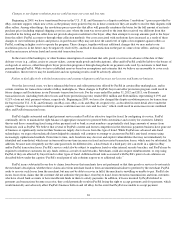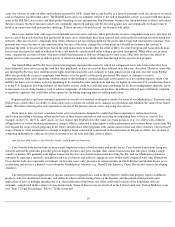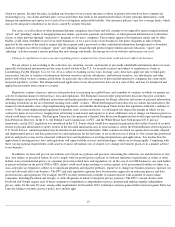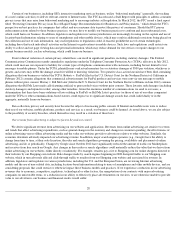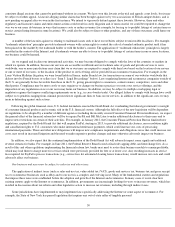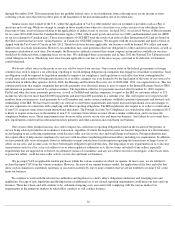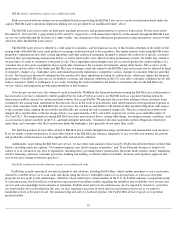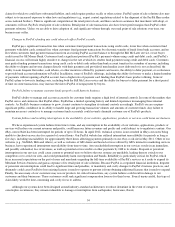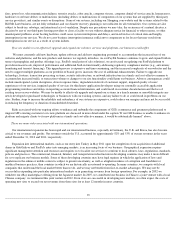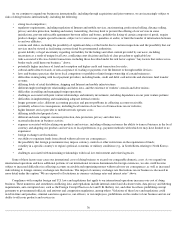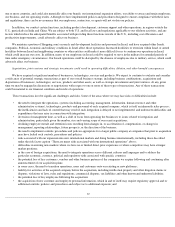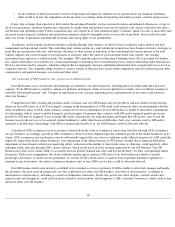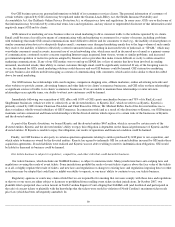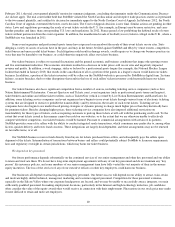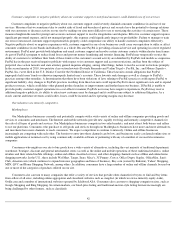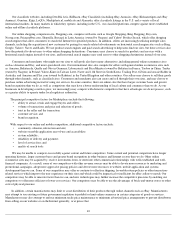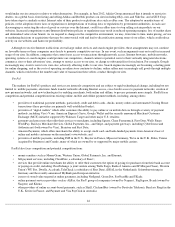eBay 2012 Annual Report Download - page 36
Download and view the complete annual report
Please find page 36 of the 2012 eBay annual report below. You can navigate through the pages in the report by either clicking on the pages listed below, or by using the keyword search tool below to find specific information within the annual report.
claims for which we could have substantial liability, and could require product recalls or other actions. PayPal's point of sale solutions also may
subject us to increased exposure to other laws and regulations (e.g., export control regulations related to the shipment of the PayPal Here reader
across national borders). There is significant competition at the retail point of sale, and there can be no assurance that merchants will adopt, or
consumers will use, PayPal's retail point of sale solutions. Retail point of sale transactions also have lower profit margins than PayPal's other
payment solutions. Unless we are able to drive adoption of, and significant volume through, our retail point of sale solutions over time, our
business may suffer.
Changes in PayPal's funding mix could adversely affect PayPal's results.
PayPal pays significant transaction fees when customers fund payment transactions using credit cards, lower fees when customers fund
payments with debit cards, nominal fees when customers fund payment transactions by electronic transfer of funds from bank accounts, and no
fees when customers fund payment transactions from an existing PayPal account balance or through the Bill Me Later service, or use buyer
credit issued by GE Money Bank. Customers fund a significant portion of PayPal's payment volume using credit and debit cards, and PayPal's
financial success will remain highly sensitive to changes in the rate at which its senders fund payments using credit and debit cards. Customers
may prefer funding payment transactions using credit cards or debit cards rather than bank account transfers for a number of reasons, including
the ability to dispute and reverse charges directly with their payment card provider if merchandise is not delivered or is not as described, the
ability to earn frequent flier miles, cash rebates, or other incentives offered by payment card issuers, the ability to defer payment, or a reluctance
to provide bank account information to PayPal. In addition, some of PayPal's offerings, including the ability for buyers to make a limited number
of payments without opening a PayPal account, have a higher rate of payment card funding than PayPal's basic product offering. Some of
PayPal's plans to lower its funding costs, including both the Bill Me Later service and the ability for buyers to defer payment for a short period
of time on some transactions, may increase the risk to PayPal of nonpayment by buyers,
PayPal's failure to manage customer funds properly could harm its business.
PayPal's ability to manage and account accurately for customer funds requires a high level of internal controls. In some of the markets that
PayPal serves and currencies that PayPal offers, PayPal has a limited operating history and limited experience in managing these internal
controls. As PayPal's business continues to grow, it must continue to strengthen its internal controls accordingly. PayPal's success requires
significant public confidence in its ability to handle large and growing transaction volumes and amounts of customer funds. Any failure to
maintain necessary controls or to manage customer funds accurately could severely diminish customer use of PayPal's products.
Systems failures and resulting interruptions in the availability of our websites, applications, products or services could harm our business.
We have experienced system failures from time to time, and any interruption in the availability of our websites, applications, products or
services will reduce our current revenues and profits, could harm our future revenues and profits and could subject us to regulatory scrutiny. Our
eBay.com website has been interrupted for periods of up to 22 hours. In April 2012, technical systems issues resulted in eBay.com users being
unable to checkout on our sites for a period of several hours. Our PayPal website has suffered intermittent unavailability for periods as long as
five days, including unavailability for approximately three hours affecting payments primarily on our ebay.co.uk site in May 2011. Other of our
websites (e.g., StubHub, Milo and others), as well as websites of GSI clients and hosted services offered by GSI's interactive marketing services
business, have experienced intermittent unavailability from time to time. Any unscheduled interruption in our services results in an immediate,
and possibly substantial, loss of revenues, as well as potential service credits or other payments by GSI to its clients. Frequent or persistent
interruptions in our services could cause current or potential users to believe that our systems are unreliable, leading them to switch to our
competitors or to avoid our sites, and could permanently harm our reputation and brands. Reliability is particularly critical for PayPal, which
faces increased expectations on the part of users and merchants regarding the full-time availability of PayPal's services as it seeks to expand its
Merchant Services business and gain acceptance of its retail point of sale solutions. Because PayPal is a regulated financial institution, frequent
or persistent site interruptions could lead to significant fines and penalties, or mandatory and costly changes to PayPal's business practices, and
ultimately could cause PayPal to lose existing licenses it needs to operate or prevent it from obtaining additional licenses that it needs to expand.
Finally, because many of our customers may use our products for critical transactions, any system failures could result in damage to our
customers and their businesses. These customers could seek significant compensation from us for their losses. Even if unsuccessful, this type of
claim likely would be time-consuming and costly for us to address.
Although our systems have been designed around industry-standard architectures to reduce downtime in the event of outages or
catastrophic occurrences, they remain vulnerable to damage or interruption from earthquakes, hurricanes, floods,
34


